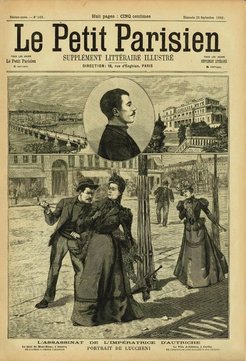Political crime, legal responses and transnational criminal law regimes
Completed Research Project

The project investigates the legal responses to political conflicts, perceived or criminalised as political crimes, and the related formation of transnational criminal law regimes in the 18th and 19th century. The focus of research is not so much on the concrete phenomenology of revolts, assassination attempts or ‚terrorism‘, but rather on how justice, police and media dealt with them and interpreted them as political crimes. A crucial question aims to determine historically comparable patterns of legal practices and security measures to such forms of political violence, which can be traced back to the early modern period. This is empirically examined using the examples of revolts and assassination attempts and their interdependencies with criminal justice, legislation, policing as well as juridical-political discourses and popular media. A comparative transatlantic perspective includes legal responses to violent political conflict in Ibero-America and Western Europe, which are analysed in case studies and a workshop (‘Violent political conflicts and legal responses: a transatlantic perspective’.
Therefore, research also focuses on the topic of cross-border political crime – ranging from political dissent, refugees and exiles to upheaval, attempts and other manifestations of political violence – which were perceived and criminalised as transboundary security threats and lead to the formation of transnational criminal law and security regimes. Relevant research investigates specific areas and activities of transnational legal interaction – extradition, political asylum, judicial and police cooperation – that were shaped in international treaties, national law, international expert discourses and various state practices by a variety of divers actors involved. A main objective is to analyse the interdependences between transnational and national norms, the actual state practices and international discourses, conferences and associations. A key question concerns to what extent the observed legal-historical processes and developments can be interpreted with the theoretical concept of ‘securitisation’, ‘juridification’, ‘regime collisions’ and ‘multinormativity’ and if they contributed to the formation of a permanent normative order of transnational criminal law and a transnational governance of violence, crime and security. This essential approach is further developed with regards to the respective relations and activities of European and Latin American actors in the closely connected project Transnational Criminal Law in Transatlantic Perspective (1870-1945).
Dissertation projects explore the following case studies:
- Criminalizing politics Legal responses to political conflicts in Brazil (1889-1930) (Raquel Sirotti)
- Transnational Criminal Law Regimes from 1871-1914: The Reactions of the German and European Legal Systems to Political Crime (Tina Hannappel)
- Political Crime and Transnational Criminal Law Regimes in the 19th Century: The Case of the German Federation (Conrad Tyrichter)
In 2020, Raquel Sirotti concluded her PhD project and the book is due to be published in the Max Planck Studies in Global Legal History of the Iberian Worlds.
Conrad Tyrichter concluded his PhD project, which had been carried out within the Cluster of Excellence ‚The Formation of Normative Orders and examines the formation of transnational criminal law regimes during the 19th century by using the example of cross-border prosecution of political crime in the German Federation. The resulting dissertation has been published in 2019 titled „Die Erhaltung der Sicherheit. Deutscher Bund, politische Kriminalität und transnationale Sicherheitsregime im Vormärz“ (The maintenance of security. The German Confederation, Political Crime and Transnational Security Regimes in the Vormärz) in the Institute’s series „Studien zu Policey, Kriminalitätsgeschichte und Konfliktregulierung“ (Studies on Policey, History of Crime and Conflict Regulation).
Additional research results developed in cooperation with the Cluster of Excellence and the project 'Securing Europe, fighting its enemies 1815-1914' were published in the volume "The Transnationalisation of Criminal Law in the Nineteenth and Twentieth Century". The nine case studies collected in this volume cover cross-border political crime and security threats, extradition and expulsion, police cooperation and international expert discourses on social crime and torture. The volume thus traces the historical development of transnational criminal law as a formation of temporally, spatially and legally limited criminal and security regimes.
The project has also been presented in the Yearbook 2018 of the MPG.
